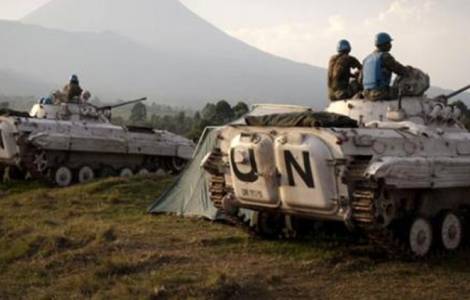
Kinshasa (Agenzia Fides) - "If this situation of pacification were to extend to the entire province of South Kivu, there would be space and hope for continuous socio-economic development for farmers and ranchers", states the organization for the defense of human rights ACMEJ, active in the province of South Kivu, in the east of the Democratic Republic of Congo, in reporting the situation which has arisen in some areas since the withdrawal of the UN peacekeepers began. South Kivu, together with North Kivu and Ituri, are the three eastern provinces of the Democratic Republic of Congo (DRC) for decades in the throes of instability caused by various armed groups of local and foreign origin.
The UN Mission in the DRC (MONUSCO) has been deployed in these areas, but its action is strongly criticized by the local populations, to the point that the government of Kinshasa has asked for its withdrawal (see Fides, 6/10/2022).
"Today we can say that, in some villages of South Kivu, since the MONUSCO soldiers stopped going to the hot areas under the control of national and foreign armed groups, there is a feeling of peace and security. We note, in fact, a movement of civilians who are beginning to return to some villages located on the state road n. 5 of the Ruzizi plain, towards the town of Uvira", ACMEJ states.
According to the local NGO, members of some armed groups would be willing to integrate the ranks of the regular army but, ACMEJ warns, "they need to be dispersed in provinces far from the countries of habitual residence" to prevent them from returning to their original groups. The past integration of soldiers from various armed groups into the Congolese army has resulted in serious human rights violations committed by the military themselves.
Therefore, if the government of Kinshasa tries to regain control of the east of the country by relying no longer on the UN but on its own army and on an intervention force promoted by the States of the East African Community (Burundi, Kenya, Rwanda, Tanzania, South Sudan, Uganda and DRC), the situation is far from being stabilized. What is worrying is not South Kivu, but North Kivu and Ituri. Despite the establishment of the martial law, on May 6, 2021, the number of people killed in these two provinces doubled or, in some areas, even tripled compared to the period before the establishment of the martial law. This was stated in a report on the crimes allegedly committed by the Allied Democratic Forces (ADF, a group of Ugandan origin that later joined the Islamic State in North Kivu and Ituri, in the eleven months before and after the establishment of the martial law, presented in March by the national deputy Katembo Mbusa Tembos Yotama and the provincial deputy Mbenze Yotama, both elected in Butembo (North Kivu).
In addition there are the accusations of connivance between the regular military and some local armed groups to counter the M23, an armed movement suspected by Kinshasa of being in collusion with neighboring Rwanda (see Fides, 5/11/2022). In short, if the UN peacekeepers are frowned upon by the local population for alleged inefficiencies or even connivance with local guerrillas, even the regular armed forces must demonstrate that they are able to restore security while respecting human rights. (L.M.) (Agenzia Fides, 7/11/2022)